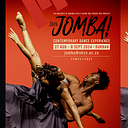IN SEARCH OF COMMUNITY, DANCING TO CONNECT…
By Mhlengi Ngcobo
“These films represent something really significant in terms us of holding hands across the continent” Dr Lliane Loots shares in her opening address to the “AFRICAN DIGITAL VOICES” which screened on 5 September. These are profound words reminding us that through dance we tell stories, hold hands and form diverse communities of empathy and embodiment.
Le Sol Oblige (The Earth Obliges) is a magnificent dance piece with seven performers (Manon Payet, Tony Ignacimouttou, Robin Fabre, Perine Lege, Tristan Curco-Llovera, Cecile Vitry and Galaad Quenouillere Benalouane) which takes us on an excursion through vast arid landscapes. The dance is set in a semi-desert area surrounded by mountains. Choreographed by Didier Boutiana and Cedric Demaison from SOUL CITY a Reunion Island-based company, the work relies on stylized everyday movement. The dancers stand on each other’s shoulders, rising and falling, always supporting each other, always supported by the original “mother”: Earth. The film with its use of innovative camera angles and shots, really offers a sense of the smallness of man/woman and the vastness of our earth.
Vincent Sekwati Mantsoe’s film CUT (part1) is rendered in black and white and filmed in Mantsoe’s studio space with its black floors and white walls. Mantsoe is this year’s JOMBA! Legacy artist, and in this film we are treated to his iconic solo performance style and his Goba technique, an Afro-fusion from that Mantsoe has developed over the 30 year span of his international career. Heavy and light movements exemplify Mantsoe’s performance. Director France Pizon catches Mantsoe’s signature lighting swift feet, contractions and hand that create a motion blur at the speed of his movement. The frame cuts throughout the film. Mantsoe is a South African choreographer and performer well known for his trace-dancing and near the end of the work, the mood intensifies as Manstsoe’s ancestors communicate through him. Lokhu kuyavela uma umdanso wakhe usuya ngase maphethelweni, lapho egida sa muntu wedlozi, phecelezi iSangoma.
One step at a time by Pak Ndjamena and Ivan Barros which premiered on this JOMBA! Platform, gives us an overview of the conditions of refugees in Mozambique. The work is deliberately political and at times, confrontational too! Our bodies are archives in which we store precious things, our beliefs and traditions. If these bodies are destroyed (which is captured in this dance piece where the silhouette of Ndjamena is consumed by fire), if we are endlessly displaced and disposed of, then we shall not be able to share our treasures in community for the future.
The opening scene plays with light and dark, dancer Ndjamena is seen in different forms in light and shadow his movement is erratic. Various subtitles appears on screen, one stating “More than 784,000 people are internally displaced in the Northern Mozambique due to violence perpetrated by non-state armed groups”, the work confronts this crisis head on! The title of the dance appears on screen and the body of Ndjamena lying on a dusty ground fades in. He is trying to fight his way up from the ground, it’s not easy. How do you rise with weight of such burden?
The artistry displayed across the three films makes for a dynamic programme that explores African stories, written with, on and through African bodies. We are truly fortunate in Durban to play host to a festival such as JOMBA! which brings embodied truths home and encourages a community of connection in doing so!
JOMBA!’s “AFRICAN DIGITAL VOICES” is available for free on the festival’s YouTube Channel until 11 September: https://www.youtube.com/watch?v=B6DSOd7Q90M.
